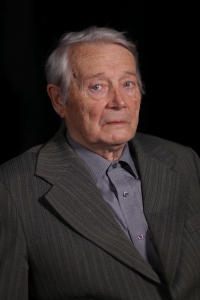“I also came into contact with antiquarians and other people, as far as it goes, the whole organisation, as I would get in the repositories, where the forbidden books had been stored, to the so-called Ústřední sklad knih (The Central Book Repository), USK, in Laub Street. There were some older pieces, but mostly they had recent literature. They had some older books, from the 19th century, but mostly they were recent. And I could buy there, as I did have the card, for the assessment price, and that was something. As I loved to build my collection of books so I would surpass my father. Maybe I could say that it had been run by Mr Pešek. You had to put slippers on, you would go with a cart, those were beautiful underground halls. And there were shelves reaching up to the ceiling filled with books, books on the occult sciences for example. Freemasonry. Rosicrucianism. Nazism. Italian fascism. Fascism of the Balkans. Social Democracy. Social Democrats had been under tight surveillance. More than... Then there was communist literature published outside the centre. These were under the tightest surveillance, and there would be a massive commotion it some of it would disappear, anything that wasn´t published in Berlin. That would mean in Moscow. Or in Leningrad. Trotskyism. Various branches of anarcho-syndicalism. So one would get a decent insight into political sciences. There were quite rare prints. Mussolini for example was a considerable writer, he had been interested in Czech history, he wrote this play, Mistr Jan Hus. Žižka. I bought it. It had been really cheap there, and I could be in the records till it would be written off, at least some of the book; Masaryk, of course, Beneš, Štefánik, it was all there. Soukup, the whole... But also Pražák had been unwanted. But that would be changing a bit. For some time, there were all the Arabs, and then, as Nasser would become friend, Nasser would disappear. And Jewish literature, of course. Just everything. Zionism, but also the Kabbalah and the occult. Both books on politics and non-political ones. Works on religion or the Jewish state, in the first place, the Jewish state, oh yes! Even the Seven-Day War (Six-Day War) had already been there. And when the Arabs would start to behave... Or Tito. Yugoslavia had really been a problem, but then, they would regret the mistakes they made while dealing with Tito´s Yugoslavia, so the books would disappear from the forbidden literature section. But some topics were invariable. Religion, just about everything. All the sects. From the Seventh-day Adventists on, just everything. The Orthodox Church. In all languages possible. Writings by Ante Pavelić, a Croatian fascist. Mein Kampf in Czech, Russian, in every language you would imagine. All that had been there. It was all there. That was just terrible!”

